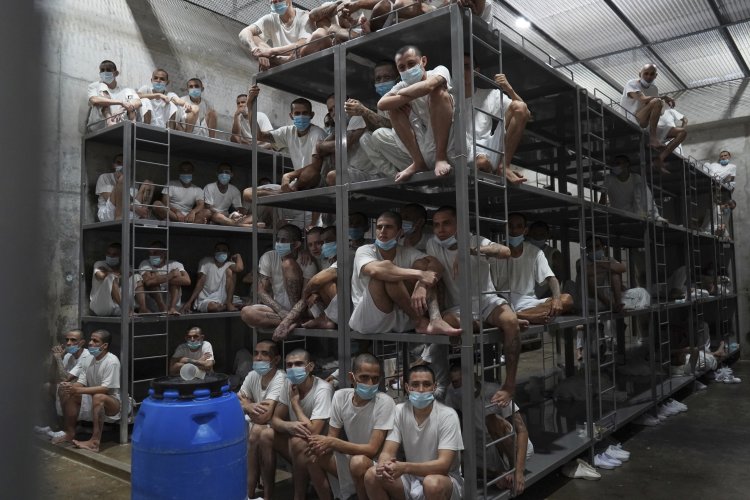Can the Supreme Court Prevent Trump from Establishing a Second Guantanamo?
The administration is attempting to establish a legal void that may surpass the excesses seen during the post-9/11 era.

Now, the Trump administration appears poised to exploit this framework to expedite the deportation of a significant number of individuals to El Salvador during a time of peace, and with minimal legal oversight. President Donald Trump has invoked the 18th-century Alien Enemies Act, claiming that the U.S. is engaged in armed conflict—within its own borders—with the Venezuelan government and the Venezuelan gang Tren de Aragua.
Recent developments have highlighted the serious flaws in the government's approach: last week, officials acknowledged that a man was mistakenly deported from Maryland to El Salvador, despite a court order permitting him to remain in the U.S. While the administration initially suggested there was nothing it could do to rectify the situation, the Supreme Court subsequently ordered the administration to "facilitate" his release. Notably, the court refrained from mandating that the administration "effectuate" his release, a distinction that could have significant implications. This incident serves as a clear indicator that the court is not inclined to simply endorse the administration's actions.
Furthermore, the government has been largely reticent about the circumstances surrounding the deportation of undocumented immigrants allegedly linked to Venezuelan gangs. CBS News’ 60 Minutes reported that "the overwhelming majority have no apparent criminal convictions or even criminal charges."
The administration's maneuvers suggest a deliberate effort to sidestep established American law by sending individuals to a legal void devoid of rights, processes, or avenues for appeal.
The resolution of this situation largely rests with the Supreme Court, which has yet to weigh in on several critical matters and has offered mixed signals. Following the court's reprimand of Trump's approach last Thursday, five Republican justices granted the administration significant leeway by allowing the continued detention of individuals under the AEA, making it more challenging for them to contest their deportations. The justices hinted they might endorse some—if not all—of the administration's legal strategies.
Interestingly, past Guantanamo Bay cases may provide insights into how the current court will handle these issues. The justices who previously constituted the majority in landmark cases affirming rights for detainees no longer serve. Those presently sitting, including John Roberts, Clarence Thomas, and Samuel Alito, dissented at that time, while Neil Gorsuch and Brett Kavanaugh were part of the majority in the recent decision. In a concurring opinion, Justice Brett Kavanaugh referenced “transfers of Guantanamo and other wartime detainees” to support the majority's ruling.
While the potential for lengthy legal battles looms, comparisons to Guantanamo Bay are already evident to those familiar with that chapter in history. David Cole, a Georgetown law professor and former ACLU National Legal Director, remarked, “In both cases, the U.S. is labeling people ‘enemies’ with little or no process, and then shipping them offshore. And in both cases the U.S. is claiming that because they are offshore, they have no rights.”
Significant distinctions exist, however. Cole noted, “The biggest one is that al Qaeda actually attacked us and we were in an actual and extended armed conflict with them. By contrast, nobody even heard of the Venezuelan gang until Trump declared, falsely, that they had ‘invaded’ us, and we have never been in an armed conflict with them.” He added that those detained under Trump's administration were all present in the U.S., thus entitled to full due process rights. Furthermore, Cole noted that while Guantanamo was problematic, the prison in El Salvador is likely to be even worse.
For those not of a certain age, understanding the political and legal atmosphere post-9/11 can be challenging. The attacks resulted in nearly 3,000 American deaths, leading to widespread fears of further violence.
The Bush administration capitalized on this environment, adopting extraordinary legal positions that foreshadow the current administration's stances. The government asserted that U.S. courts had no jurisdiction over Guantanamo detentions, contending that the president could disregard both national and international laws governing the humane treatment of detainees.
This was followed by a series of scandals and unprecedented legal confrontations, including shocking disclosures about prisoner abuse in Iraq and documented instances of torture by CIA personnel.
In the wake of 9/11, the Supreme Court confronted novel questions regarding the government's detention authority during wartime. Eventually, a majority of justices ruled that Guantanamo detainees had the right to challenge their detentions in U.S. courts through habeas proceedings, which allow individuals to contest unlawful imprisonment. Following Bush's presidency, the Obama administration enacted a broad ban on torture.
Trump’s attempts seem designed to bypass these legal constraints and go further than Guantanamo Bay by detaining U.S. residents during peacetime and potentially deporting them to a foreign nation.
The Supreme Court may ultimately support this direction. In a recent ruling, five Republican justices lifted a temporary restraining order preventing the administration from deporting additional individuals under the Alien Enemies Act while awaiting a final ruling. The majority concluded that the administration could continue detaining individuals, stipulating, however, that current and future detainees must be informed of their situation and allowed to seek habeas relief in their confinement district before deportation. Although the administration tried to avoid court scrutiny, it seems to have advanced its agenda in other crucial ways.
The ruling’s implications are noteworthy for what it omits. The majority did not clarify whether the Alien Enemies Act can be legitimately applied in this context, leaving open the possibility that Trump could claim the U.S. is "at war" with a Venezuelan gang, despite substantial factual and legal concerns.
The majority also ruled that habeas proceedings would be the only route for detainees seeking redress and dismissed various claims under the Administrative Procedures Act. Notably, the administration is capturing individuals systematically within U.S. borders rather than on an ad hoc basis in combat zones.
Regarding habeas proceedings, the court indicated that judicial review may be limited, with statements suggesting that the AEA restricts judicial oversight. Clarifying the extent of this limitation will hinge on resolving multiple outstanding issues.
Additionally, the court suggested that cases must be brought individually rather than as class-action lawsuits, which could result in hundreds of habeas filings in conservative jurisdictions, such as Texas, where some individuals are currently held.
Several significant procedural questions remain unresolved. Among them are: Are detainees entitled to legal representation? What evidence standard must the government meet to justify a deportation? If evidentiary hearings occur, what rules will apply? How much deference will be afforded to the administration and officials' claims against detainees? The government has relied on questionable hearsay to detain individuals; will such evidence be permissible?
Resolving these matters, as was necessary with Guantanamo, could take years and will likely require navigating a complex web of court interpretations and congressional actions.
With the Trump administration's rapid and assertive approach to deportation, it was almost certain that a significant blunder would occur.
Even if the U.S. were actually in a state of war—which it is not—the potential for significant error is clear, echoing lessons learned from Guantanamo experiences.
“The very fact that by the time it left office the Bush administration had released over 500 of the people it initially detained at [Guantanamo] shows that they were not all ‘enemy combatants,’ as was initially claimed,” Cole stated. “And there are credible allegations already that the Trump administration wrongly identified people here as gang members.”
Regardless of their affiliations, he maintains, “they are entitled to due process, and they are not ‘enemies’ in a declared war as the [Alien Enemies Act] would require.” Ultimately, the extent of the “due process” they will receive from this Supreme Court is still uncertain.
The notion of “due process” may sometimes feel abstract, yet it forms a fundamental pillar of American law, enshrined in the Constitution for important reasons. The availability of habeas relief—an essential safeguard against wrongful detention—is not merely a legal technicality; it embodies a commitment to the rule of law and the principle that the legal system should serve as a civilized instrument rather than a weapon of intimidation and brutality.
Attacks on this fundamental principle threaten everyone—even American citizens.
When this case reaches the Supreme Court for a final judgment, the Republican justices will face a crucial challenge. Will they support Trump's unprecedented legal interpretation, granting the executive branch nearly unchecked power? They have already acquiesced in some respects, despite last Thursday's ruling.
Alternatively, will they heed the lessons learned from the post-9/11 era and Guantanamo, insisting on strong protections to ensure that the courts fulfill their role in enforcing immigration laws without unnecessary violence?
Thursday's decision marks a positive step, but the fact that the Trump administration initially resisted restoring the mistakenly deported man is troubling. Concerns remain about whether the administration can truly “facilitate” his release after investing $6 million to add to facilities in El Salvador. The Trump administration appears to be crafting a set of mechanisms that would establish a hierarchy of American residents with varying constitutional rights—a hierarchy that, regardless of current feelings of security, can shift based on the government's future decisions.
Mathilde Moreau for TROIB News












